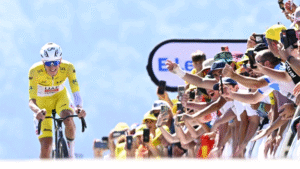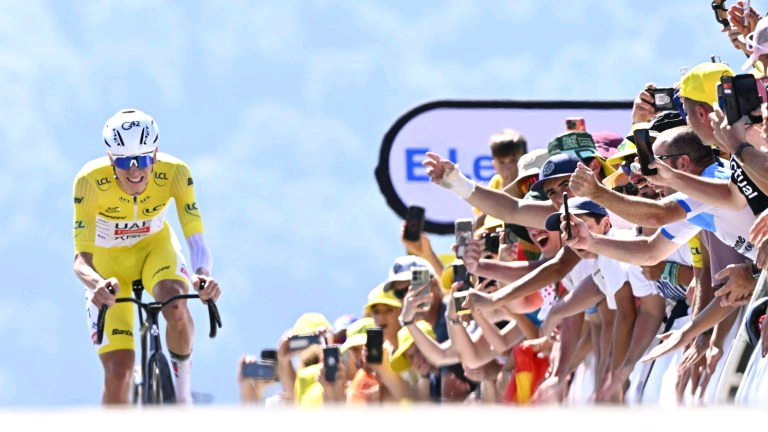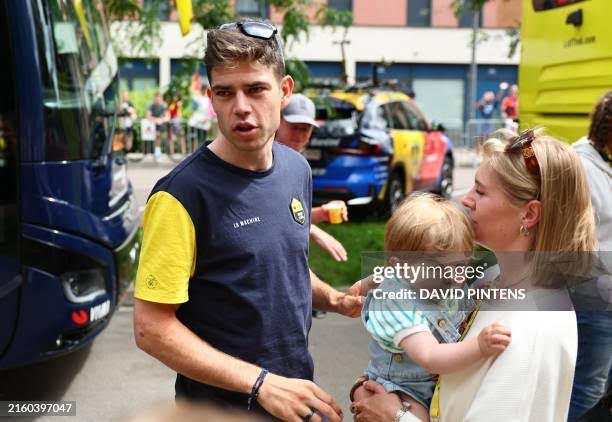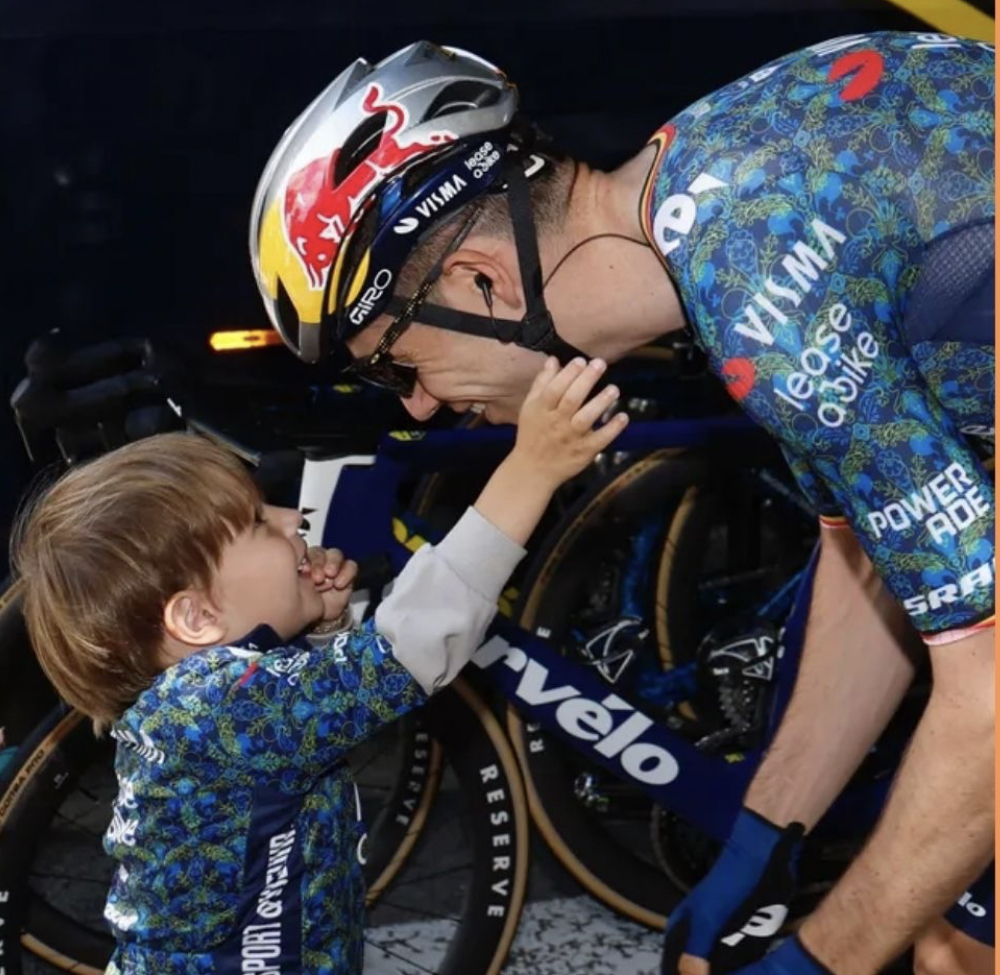Breaking News: Tadej Pogačar’s Dominance at the Tour de France Sparks Ominous Lance Armstrong Comparisons**
The 2025 Tour de France has once again captured the world’s attention, not only for its grueling routes and breathtaking scenery but also for the extraordinary performance of the Slovenian prodigy, Tadej Pogačar. As he continues to dominate the race with a series of jaw-dropping performances, comparisons to one of the most controversial figures in cycling history—Lance Armstrong—have begun to surface. These comparisons, fueled by Pogačar’s relentless pursuit of victory and seemingly insurmountable prowess, have ignited a debate on talent, dominance, and the shadow of doping allegations that have historically overshadowed cycling’s brightest stars.
Tadej Pogačar, born in 1998 in Komenda, Slovenia, quickly rose through the ranks of professional cycling with his exceptional climbing ability, strategic acumen, and resilience. Turning professional in 2019 with UAE Team Emirates, he made an immediate impact by winning the Tour de France in his second year as a pro, at just 21 years old. His victory was not merely a fluke but the sign of a cyclist with an extraordinary potential to redefine the sport.

Since then, Pogačar has continued to impress, securing multiple stage wins, overall classifications, and demonstrating an ability to perform under pressure. His combination of raw power, tactical intelligence, and mental toughness has made him a formidable contender and a fan favorite. Yet, with his ascent into the upper echelons of cycling, some observers have drawn unsettling parallels to Lance Armstrong—whose career was marred by doping scandals and allegations of systemic performance-enhancing drug use.
This year’s Tour de France has been nothing short of spectacular, with Pogačar showcasing an almost superhuman level of endurance and strategic mastery. His performances in mountain stages—particularly on the Alpe d’Huez, Col du Galibier, and the iconic Pyrenean ascents—have been nothing short of breathtaking, often leaving rivals in his wake and securing decisive time gaps.
In particular, his stage wins and his ability to respond to attacks from other top contenders like Jonas Vingegaard and Geraint Thomas have demonstrated a level of dominance rarely seen in modern cycling. His time-trial performances have also been exceptional, often cutting into leads and cementing his position as the race leader with multiple days remaining.
The media and fans alike have lauded his performances as ‘monumental,’ ‘historic,’ and ‘perhaps the greatest in modern cycling history.’ Yet, beneath the admiration, a sense of unease has started to percolate—particularly among critics and skeptics who recall the dark days of doping scandals that tarnished the sport in the early 2000s.
Lance Armstrong’s career was once characterized by unparalleled dominance in cycling, winning the Tour de France seven consecutive times from 1999 to 2005. However, his victories were later stripped due to a massive doping scandal, revealing a complex web of performance-enhancing drug use, systematic doping programs, and cover-ups.
The comparison between Pogačar and Armstrong springs from several shared traits: extraordinary talent at a young age, relentless pursuit of victory, strategic brilliance, and a seemingly superhuman ability to perform in mountain stages and time trials. Nevertheless, the key difference—and the core of the controversy—is the question of doping.
Some critics argue that Pogačar’s rapid ascent and performance levels echo the pattern of previous doping-tainted athletes, fueling speculation that he may have benefited from performance-enhancing methods. Others counter that such allegations are unfounded and that Pogačar’s clean record, consistent anti-doping stance, and the transparent efforts of the cycling authorities support his legitimacy.
Despite these arguments, the specter of Armstrong’s legacy looms large. Armstrong’s case serves as a cautionary tale about the perils of unchecked dominance and the importance of integrity in sport. For many fans and experts, Pogačar’s current performances evoke the same feelings of awe mixed with suspicion.
Cycling’s history is, unfortunately, intertwined with doping scandals. The 1990s and early 2000s were marred by systematic doping programs, with high-profile cases like that of Floyd Landis, Tyler Hamilton, and, most famously, Lance Armstrong. The widespread use of erythropoietin (EPO), blood doping, and anabolic steroids led to a crisis of credibility and prompted sweeping reforms.
In recent years, organizations like the UCI (Union Cycliste Internationale) have taken steps to enhance testing protocols, implement biological passports, and foster a culture of clean sport. Despite these efforts, skepticism remains, especially when athletes display performances that seem to defy human limits.
Pogačar’s performances have reignited these debates, prompting discussions about the effectiveness of anti-doping measures and the potential for clandestine doping practices to still exist beneath the surface of modern cycling.
Tadej Pogačar has consistently maintained his innocence and commitment to clean cycling. His team, UAE Team Emirates, has also emphasized their focus on transparency and anti-doping efforts. In interviews, Pogačar has spoken about the importance of integrity, hard work, and the support of his team and family.
Looking ahead, the cycling community faces the challenge of balancing admiration for Pogačar’s talent with the necessary vigilance to prevent doping. The sport’s credibility hinges on rigorous testing, transparent investigations, and fostering a culture where clean athletes are celebrated.
Pogačar’s current dominance has the potential to elevate cycling’s profile globally, bringing new fans and interest to the sport. However, it also carries the risk of suspicion and controversy if not managed with transparency and integrity.
The debate surrounding Pogačar and Armstrong reflects a broader issue in sports—how to distinguish extraordinary talent from illicit enhancement. As athletes push human boundaries, the temptation to seek performance advantages grows, raising ethical questions about fairness and the spirit of sport.
In recent years, technological advancements, better training methods, and nutritional science have contributed to higher athletic standards. But at what point does performance cease to be a testament to human effort and become a product of doping or unethical practices?
Sports organizations worldwide continue to wrestle with these questions, striving to uphold the integrity of competition while recognizing the limits of human potential. The case of Pogačar exemplifies these challenges, illustrating how exceptional performances can inspire awe but also invite scrutiny.
Tadej Pogačar’s extraordinary performances at the 2023 Tour de France mark a significant chapter in the sport’s history. His dominance has captivated fans and analysts alike, inspiring comparisons to legendary—yet controversial—figures like Lance Armstrong.
While the debate continues, what remains undeniable is Pogačar’s status as one of the most talented cyclists of his generation. Whether his performances are a testament to unparalleled skill or a reflection of the complex, often shadowy world of competitive cycling, only time and transparent scrutiny will tell.
As the sport moves forward, the key will be maintaining rigorous anti-doping measures, fostering a culture of integrity, and celebrating genuine athletic achievement. In doing so, cycling can hope to rise above its troubled past and embrace a future where true talent is recognized and rewarded—free from doubt and suspicion.


